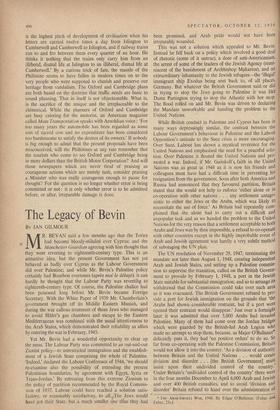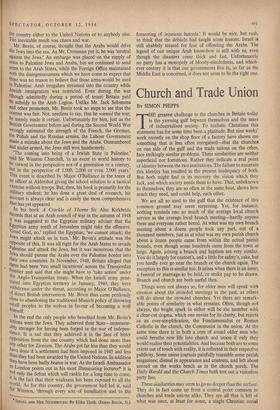The Legacy of Bevin
BY IAN GILMOUR M R. BEVAN' said a few months ago that the Tories had become bloody-minded over Cyprus; and the ..- Manchester Guardian agreeing with him thought that they were reverting to eighteenth-century type. This is an attractive idea, but the present Government has not yet behaved as badly over Cyprus as the Labour Government did over Palestine; and while Mr. Bevin's Palestine policy certainly had Bourbon overtones (apres nroi le deluge), it can hardly be thought that the Labour Party was reverting to eighteenth-century type. Of course, the Palestine chalice had been poisoned long before Mr. Bevin became Foreign Secretary. With the White Paper of 1939 Mr. Chamberlain's government brought off its Middle Eastern Munich, and during the war callous treatment of those Jews who managed to avoid Hitler's gas chambers and escape to the Eastern Mediterranean was combined with the usual attentiveness to the Arab States, which demonstrated their reliability as allies by entering the war in February, 1945.
Yet Mr. Bevin had a wonderful opportunity to clear up the mess. The Labour Party was committed to an out-and-out Zionist policy—to unrestricted immigration and the establish- ment of a Jewish State comprising the whole of Palestine. 'Indeed,' declared the Labour Conference of 1944, 'we should re-examine also the possibility of extending the present Palestinian boundaries, by agreement with Egypt, Syria or Trans-Jordan.' By retreating from this extreme Zionism to the policy of partition recommended by the Royal Commis- sion of 1937, Labour could have reached a solution satis- factory, or reasonably satisfactory, to all.eThe Jews would have got their State, but .a much smaller qne thlan they had been promised, and Arab pride would not have been irreparably wounded. This was not a solution which appealed to Mr. Bevin. Instead he fell back on a policy which involved a good deal of rhetoric (some of it untrue), a dose of anti-Americanism, the arrest of some of the leaders of the Jewish Agency (remi- niscent of the banishment of Archbishop Mpkarios), and an extraordinary inhumanity to the Jewish refugees—the 'illegal' immigrant ship Exodus being sent back to, of all places. Germany. But whatever the British Government said or did in trying to stop the Jews going to Palestine it was like Dame Partington trying to stop the Atlantic with her mop. The flood rolled on and Mr. Bevin was driven to declaring the Mandate unworkable and handing, the problem to the United Nations.
While British conduct in Palestine and Cyprus has been in many ways depressingly similar, the contrast between the Labour Government's behaviour in Palestine and the Labour Opposition's attitude to the Suez crisis is more encouraging. Over Suez, Labour has shown a mystical reverence for the United Nations and emphasised the need for a peaceful solu- tion. Over Palestine it flouted the United Nations and pro- moted a war; Indeed, if Mr. Gaitskell'4, faith in the United Nations was as great in 1948 as it is now his friends and colleagues must have had a difficult time in preventing his resignation from the government. Soon after both America and Russia had announced that they favoured partition, Britain stated that she would not help to enforce 'either alone or in co-operation with other nations . . . any settlement antago- nistic to either the. Jews or the Arabs, which was likely to necessitate the use of force.' As Britain had repeatedly com- plained that she alone had to carry out a difficult and unpopular task and as we handed the problem to the United Nations for the very reason that a settlement acceptable to both Arabs and Jews was by then impossible, a refusal to co-operate with other countries except in the highly improbable event of Arab and Jewish agreement was hardly a very subtle method of sabotaging the UN plan.
The UN resolution of November 29, 1947, terminating the mandate not later than August 1, 1948, creating independent Arab and Jewish States, and setting up a Palestine commis' sign to supervise the transition, called on the British Govern' ment to provide by February 1. 1948, a port in the Jewish State suitable for substantial immigration; and so to arrange its withdrawal that the Commission could take over each area as it was evacuated. The British Government refused to pro- vide a port for Jewish immigration on the grounds that 'the Arabs had shown considerable restraint, but if a port were opened their restraint would disappear.' Just over a fortnight later it was admitted that over 5,000 Arabs had invaded Palestine. Many of them had come over the Jordan bridges which were guarded by the British-led Arab LegiOn who made no attempt to stop them, because, as Major O'Ballance* delicately puts it, they had 'no positive orders' to do so. So far from co-operating with the Palestine Commission, Britain would not allow it into the country. 'As a division of authority between Britain and the United Nations . . . would create division and disorder . . . [the British Government] must, insist upon their undivided control of the country' Under Britain's 'undivided control of the country' there were in the four months December to April 6,000 Arab and Jewish and over 400 British casualties. and to avoid 'division and disorder' Britain refused to hand over the administration of * THE ARAN-ISRARLI WAR, 1948. By Edgar O'Ballanee. (Faber and Faber, 25s.) the country either to the United Nations or to anybody else. The inevitable result was chaos and war.
Mr. Bevin, of course, thought that the. Arabs would drive the Jews into the sea. As Mr. Crossman put it, he was `neutral against the Jews.' An embargo was placed on the supply of arms to Palestine Jews and Arabs, but we continued to send arms to the Arab States, while the Foreign Office maintained with the disingenuousness which we have come to expect that there was no reason to believe that these arms. would be used ill Palestine. Arab irregulars streamed into the country while Jewish immigration was restricted. Even during the war (though admittedly during a period of truce) Britain paid its subsidy to the Arab Legion. Unlike Mr. Jack Solomons and other promoters, Mr. Bevin took no steps to see that the contest was fair. Not, needless to say, that he wanted the war; he merely made it certain. Unfortunately for him, just as the British Government before and during the Second World War wrongly estimated' the strength of the French, the German, the Polish and the Russian armies, the Labour Government Made a mistake about the Jews and the Arabs. Outnumbered and under-armed, the Jews still won handsomely.
`The coming into being of a Jewish State in Palestine,' said Sir Winston Churchill, 'is an event in world history to be viewed in the perspective not of a generation or a century, but in the perspective of 1,000, 2,000 or even 3.000 years.' This event is described by Major O'Ballance in' the tones of an officer at Aldershot giving the school solution to a tactical exercise without troops. But, then, his book is primarily for the Military student; he has done a great deal of research, his account is always clear and is easily the most comprehensive that has yet appeared. In his book A Crackle of Thorns Sir Alec Kirkbride records that at an Arab council of war in the autumn of 1948 .Nit was suggested to the Egyptian military adviser that the Egyptian army south of Jerusalem might take the offensive. `Good God, no,' replied the Egyptian, 'we cannot attack; the Jews might attack us in turn.' Mr. Bevin's attitude was the opposite of this. It was all right for the Arab States to invade Palestine and attack the Jews, but it was monstrous that the Jews should pursue the Arabs over the Palestine border into their own countries. In November, 1948, Britain alleged that !here had been 'two small incursions' across the Transjordan frontier and said that she might have to 'take 'action' under the Anglo-Transjordan treaty. When the Israeli army pene- trated into Egyptian -territory in January, 1949, they were withdrawn under the threat, according to Major O'Ballance, of direct British intervention. Mr. Bevin thus came perilously close to abandoning the traditional Munich policy of throwing small peoples to the wolves in favour of becoming a wolf himself.
In the end the only people who benefited from Mr. Bevin's actions were the Jews. They achieved their State—immeasur- ably stronger for having been forged in the war of indepen- dence. It is sad that they achieved it in the face of bitter opposition from the 6ne country which had done more than any other for Zionism. The Arabs got far less than they would have done if a settlement had been imposed in 1945 and less than they had been awarded by the United Nations. In addition they have been badly beaten in war. As the Israeli Ambassador 111 London points out in his most illuminating lectures* it is not only the defeat which will rankle for a long time to come, It is the fact that their weakness has been exposed to all the w,,.°11d. As for this country, the government had led it, said Sir Winston, 'through every sort of humiliation and to the * lsRAEL AND HER NEIGHBOURS: By Elihu Elath. (James Barrie, Ss.) fomenting of injurious hatreds.' It would be nice, but rash, to think that the debacle had taught some lessons. Israel is still shabbily treated for fear of offending the Arabs. The legend of our unique Arab know-how is still with us. even though the disasters come thick and fast. Unfortunately no party has a monopoly of bloody-mindedness, and which- ever century it is that our governments live in, so far as the Middle East is concerned, it does not seem to be the right one.











































 Previous page
Previous page